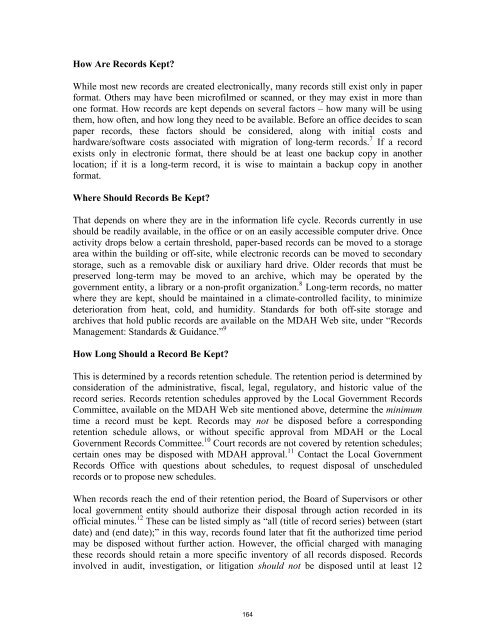in Mississippi
m2078-county-gov-ms
m2078-county-gov-ms
Create successful ePaper yourself
Turn your PDF publications into a flip-book with our unique Google optimized e-Paper software.
How Are Records Kept?<br />
While most new records are created electronically, many records still exist only <strong>in</strong> paper<br />
format. Others may have been microfilmed or scanned, or they may exist <strong>in</strong> more than<br />
one format. How records are kept depends on several factors – how many will be us<strong>in</strong>g<br />
them, how often, and how long they need to be available. Before an office decides to scan<br />
paper records, these factors should be considered, along with <strong>in</strong>itial costs and<br />
hardware/software costs associated with migration of long-term records. 7 If a record<br />
exists only <strong>in</strong> electronic format, there should be at least one backup copy <strong>in</strong> another<br />
location; if it is a long-term record, it is wise to ma<strong>in</strong>ta<strong>in</strong> a backup copy <strong>in</strong> another<br />
format.<br />
Where Should Records Be Kept?<br />
That depends on where they are <strong>in</strong> the <strong>in</strong>formation life cycle. Records currently <strong>in</strong> use<br />
should be readily available, <strong>in</strong> the office or on an easily accessible computer drive. Once<br />
activity drops below a certa<strong>in</strong> threshold, paper-based records can be moved to a storage<br />
area with<strong>in</strong> the build<strong>in</strong>g or off-site, while electronic records can be moved to secondary<br />
storage, such as a removable disk or auxiliary hard drive. Older records that must be<br />
preserved long-term may be moved to an archive, which may be operated by the<br />
government entity, a library or a non-profit organization. 8 Long-term records, no matter<br />
where they are kept, should be ma<strong>in</strong>ta<strong>in</strong>ed <strong>in</strong> a climate-controlled facility, to m<strong>in</strong>imize<br />
deterioration from heat, cold, and humidity. Standards for both off-site storage and<br />
archives that hold public records are available on the MDAH Web site, under “Records<br />
Management: Standards & Guidance.” 9<br />
How Long Should a Record Be Kept?<br />
This is determ<strong>in</strong>ed by a records retention schedule. The retention period is determ<strong>in</strong>ed by<br />
consideration of the adm<strong>in</strong>istrative, fiscal, legal, regulatory, and historic value of the<br />
record series. Records retention schedules approved by the Local Government Records<br />
Committee, available on the MDAH Web site mentioned above, determ<strong>in</strong>e the m<strong>in</strong>imum<br />
time a record must be kept. Records may not be disposed before a correspond<strong>in</strong>g<br />
retention schedule allows, or without specific approval from MDAH or the Local<br />
Government Records Committee. 10 Court records are not covered by retention schedules;<br />
certa<strong>in</strong> ones may be disposed with MDAH approval. 11 Contact the Local Government<br />
Records Office with questions about schedules, to request disposal of unscheduled<br />
records or to propose new schedules.<br />
When records reach the end of their retention period, the Board of Supervisors or other<br />
local government entity should authorize their disposal through action recorded <strong>in</strong> its<br />
official m<strong>in</strong>utes. 12 These can be listed simply as “all (title of record series) between (start<br />
date) and (end date);” <strong>in</strong> this way, records found later that fit the authorized time period<br />
may be disposed without further action. However, the official charged with manag<strong>in</strong>g<br />
these records should reta<strong>in</strong> a more specific <strong>in</strong>ventory of all records disposed. Records<br />
<strong>in</strong>volved <strong>in</strong> audit, <strong>in</strong>vestigation, or litigation should not be disposed until at least 12<br />
164


